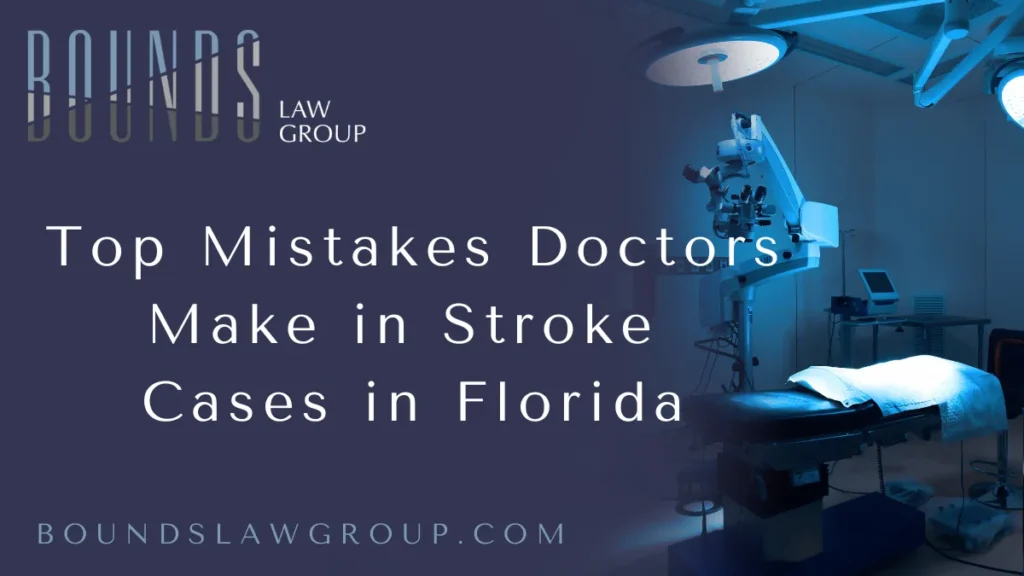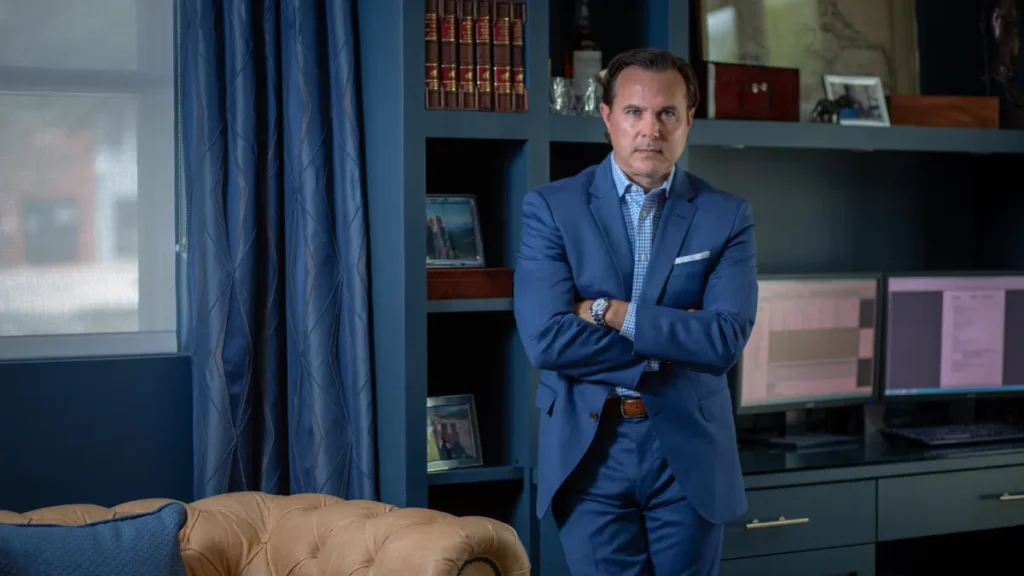
Doctor Mistakes in Stroke Cases in Florida | Bounds Law Group
When it comes to stroke care, every second counts. In Florida, patients trust their physicians to act swiftly and accurately in the face of one of the most serious medical emergencies. However, doctor mistakes in stroke cases in Florida can have catastrophic consequences. At Bounds Law Group, we represent victims of these preventable medical errors and fight for the justice they deserve.
Below, we detail the most common and devastating doctor mistakes in stroke cases in Florida, explaining how these errors occur, what the consequences are, and what legal options are available to you or your loved ones if medical negligence was involved.
Contact us now at 877-644-5122 or complete the free case evaluation form for expert legal assistance.
Failure to Recognize Stroke Symptoms Early
One of the most alarming doctor mistakes in stroke cases in Florida is the failure to identify early warning signs of a stroke. Stroke symptoms can be subtle at first, but immediate recognition is crucial.
Some symptoms doctors often overlook include:
- Sudden confusion or trouble speaking
- Numbness or weakness on one side of the body
- Blurred or double vision
- Dizziness, loss of balance, or coordination
- Severe headache with no known cause
Too often, these signs are dismissed as less serious conditions such as migraines, vertigo, or intoxication—especially in younger patients or those without obvious risk factors. This delay in diagnosis can result in missed treatment windows for life-saving therapies like tPA (tissue plasminogen activator), which must be administered within a specific time frame.

Misdiagnosis of Stroke as Another Condition
Another common doctor mistake in stroke cases in Florida is misdiagnosis. Physicians sometimes attribute stroke symptoms to other medical conditions such as:
- Hypoglycemia
- Bell’s Palsy
- Seizures
- Migraines
- Inner ear disorders
These misdiagnoses can occur in both emergency departments and primary care offices. When physicians fail to order critical imaging studies such as a CT scan or MRI, patients are often discharged prematurely without receiving the urgent care they require.
Delays in Imaging and Testing
Once stroke is suspected, rapid diagnostic testing is essential. Unfortunately, delays in ordering or interpreting imaging tests are among the most preventable doctor mistakes in stroke cases in Florida.
CT scans and MRIs should be conducted immediately upon patient arrival if stroke is suspected. Delays can result from:
- Overcrowded emergency departments
- Inadequate training or triage processes
- Communication breakdowns between hospital departments
- Failure to follow stroke protocols
These delays often mean the difference between recovery and lifelong disability—or even death.
Improper Administration of Stroke Medication
Timely and accurate medication is critical in stroke treatment. A major doctor mistake in stroke cases in Florida involves either administering the wrong medication or delaying essential treatment, such as thrombolytics like tPA.
Doctors must evaluate a patient’s medical history, contraindications, and the timing of symptoms to determine if tPA is safe to use. Failure to assess these factors can result in either failure to treat or dangerous complications like hemorrhaging.
Additionally, mismanagement of anticoagulants like warfarin or newer agents like apixaban can lead to hemorrhagic stroke or worsen an existing stroke, particularly if dosages are incorrect or not monitored.
Lack of Specialist Referral or Consultation
One of the more subtle but equally damaging doctor mistakes in stroke cases in Florida is failing to consult a neurologist or transfer the patient to a stroke center.
Non-specialist physicians may be unfamiliar with complex stroke protocols, and delaying specialist involvement often results in substandard care. Florida has numerous Comprehensive Stroke Centers that are equipped to provide advanced care, yet patients are sometimes kept in smaller facilities too long, compromising their outcomes.
Failure to Monitor Stroke Patients Post-Treatment
The treatment of stroke does not end after the initial emergency intervention. Patients require ongoing monitoring for:
- Swelling or bleeding in the brain
- Secondary strokes
- Medication side effects
- Blood pressure and glucose regulation
Many doctor mistakes in stroke cases in Florida occur during this critical post-treatment phase. Poor monitoring can result in avoidable complications, permanent brain damage, or wrongful death.
Failure to Communicate with Patient or Family
In stroke emergencies, effective communication is key. Physicians must clearly explain:
- Treatment options
- Prognosis
- Risks involved in medication or surgery
- Consent for procedures
Miscommunication or lack of communication altogether is one of the most frustrating doctor mistakes in stroke cases in Florida for families seeking answers after a tragedy. It also violates the ethical duty of informed consent and can form the basis of a medical malpractice claim.
Failure to Properly Educate Patients on Post-Stroke Care and Rehabilitation
After a stroke, comprehensive care does not stop with immediate treatment. One of the most overlooked doctor mistakes in stroke cases in Florida is the failure to adequately educate patients and their families about post-stroke care and rehabilitation.
A stroke can leave lasting effects, ranging from mild disabilities to severe impairment, and recovery can be a lengthy and complex process. However, many patients are not provided with enough information about the rehabilitation options available or the steps they need to take after being discharged.
Proper post-stroke care education should include:
- Physical therapy options for regaining motor skills
- Speech therapy for communication issues
- Psychological support for emotional and mental health
- Dietary recommendations to prevent another stroke
- Medication management to control risk factors like high blood pressure or diabetes
Without the proper guidance and resources, patients may struggle to adjust to life after a stroke or even worsen their conditions due to non-compliance or lack of understanding about their care needs. Doctors should take the time to discuss rehabilitation plans and ensure that patients and families are fully informed about the recovery process. Failing to do so can result in preventable complications and hinder the patient’s recovery.
At Bounds Law Group, we understand the crucial importance of patient education in the recovery process. If you or a loved one has experienced a stroke and feels that medical professionals failed to provide adequate guidance on post-stroke care, you may be entitled to compensation for the harm caused by this oversight.

Legal Rights for Victims of Stroke Mismanagement in Florida
If you or a loved one has been harmed due to doctor mistakes in stroke cases in Florida, you may be entitled to compensation for:
- Medical bills
- Lost wages
- Pain and suffering
- Rehabilitation costs
- Long-term care expenses
- Wrongful death damages (if applicable)
At Bounds Law Group, we have extensive experience investigating complex medical malpractice cases. We work with expert medical professionals to review the details of your care and identify if your stroke—or its complications—could have been prevented.
Our legal team is dedicated to holding negligent doctors, hospitals, and medical providers accountable. We understand the emotional and financial toll that stroke mismanagement takes on families, and we’re here to help.
Get Help From a Florida Stroke Malpractice Attorney Today
Do not let medical negligence go unchallenged. If you suspect that a doctor’s error led to a stroke or worsened a stroke outcome, speak with an experienced legal team right away. The statute of limitations for medical malpractice in Florida is limited, and your time to act may be running out.
We urge you to complete our free case evaluation form or call us now at 877-644-5122 to speak directly with a member of our legal team. There is no cost to speak with us, and you owe nothing unless we win your case.
Sources
- American Stroke Association – Stroke Symptoms and Treatment Guidelines
Provides clinical insights and protocols for stroke diagnosis and treatment.
https://www.stroke.org - Florida Department of Health – Stroke Systems of Care
Discusses stroke center designations, emergency care pathways, and reporting for Florida residents.
http://www.floridahealth.gov - National Institutes of Health – Stroke: Hope Through Research
Offers extensive details on stroke research, diagnosis methods, and recovery statistics.
https://www.ninds.nih.gov

